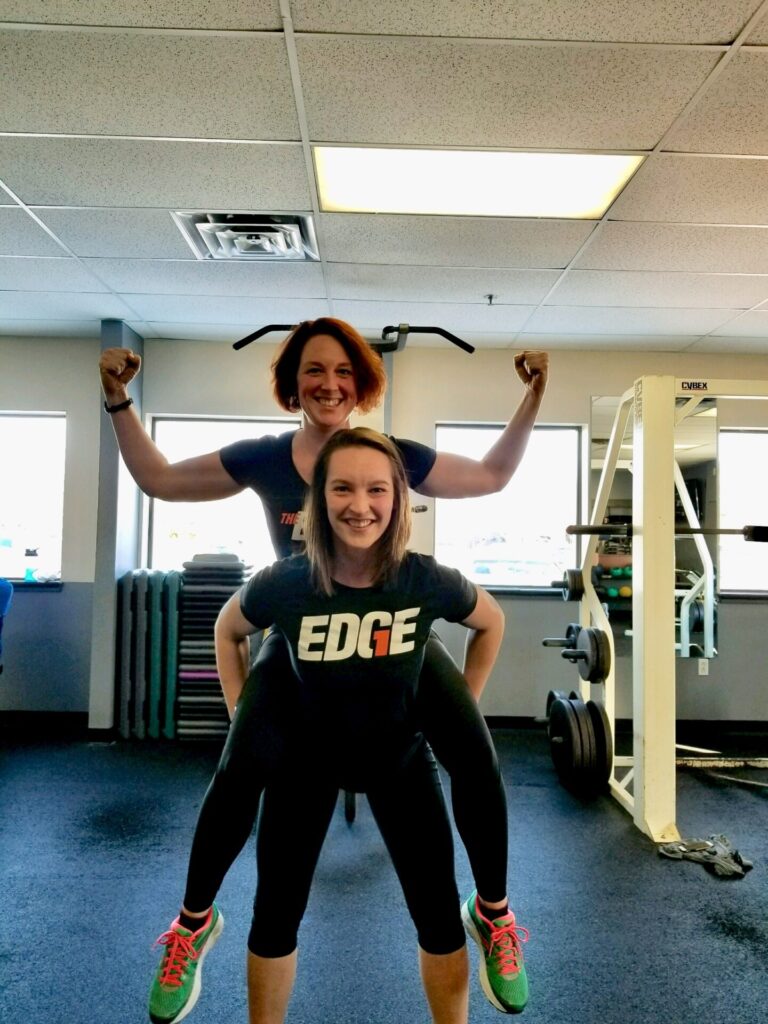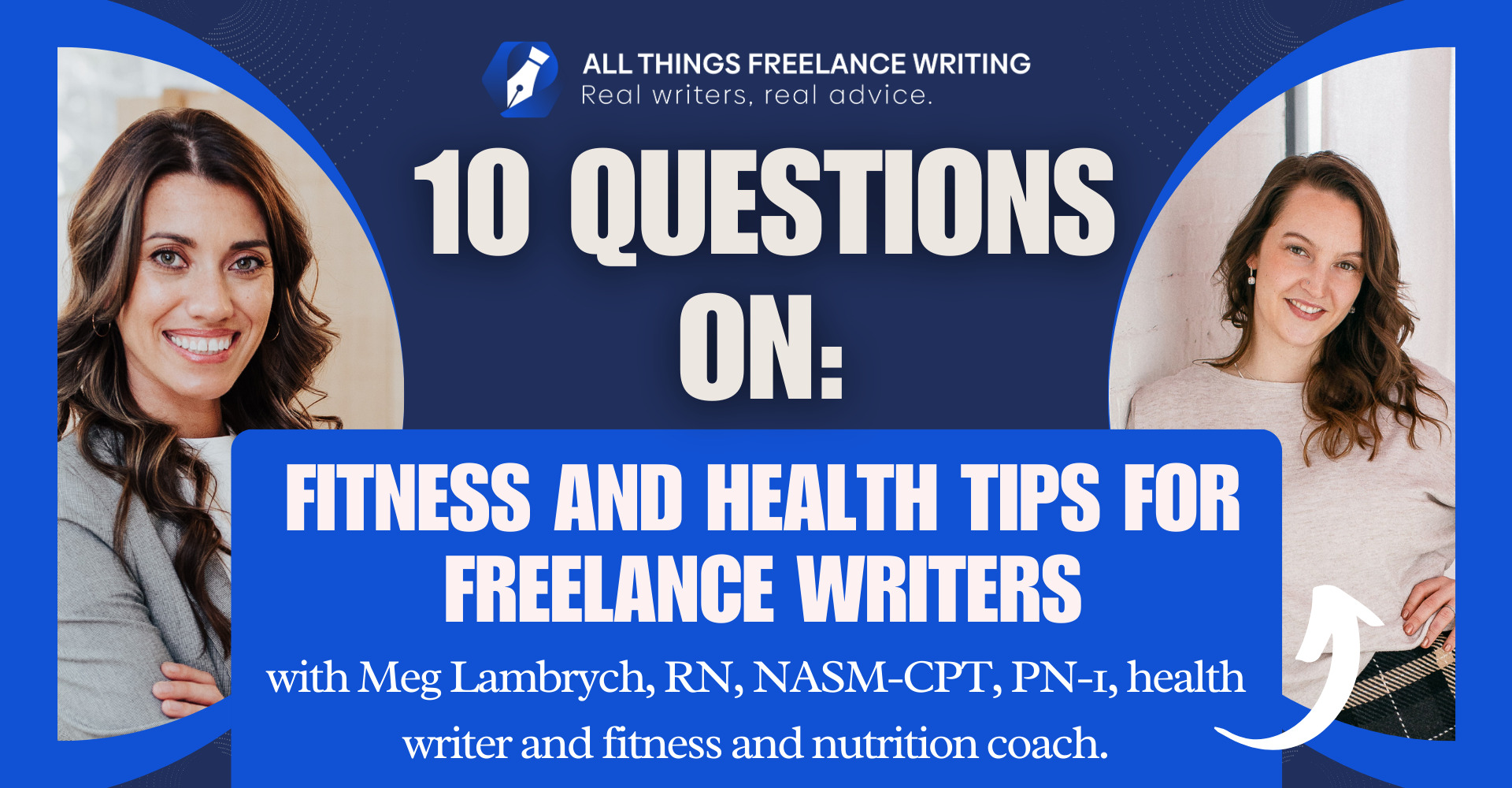Meg Lambrych, RN, NASM-CPT, PN-1 is a health writer and fitness and nutrition coach from Syracuse, New York who has been in the fitness industry for 12 years! Here are some of her recommendations for freelance writers.
1. Hi Meg! Can you share a bit about your professional background and what you do now?

My name is Meg Lambrych and I’m a registered nurse, certified personal trainer, and nutritionist. I’ve been in the fitness industry for 12 years and absolutely love busting myths, karate-chopping diet culture, and empowering clients and readers to live a big, juicy life.
2. If writers want to stay clear-minded, energized, and focused throughout busy work days, what kinds of foods would you recommend they eat?
Everyone is different, and I encourage you to experiment with foods to find what you love and which foods make you feel good. As a general rule, prioritizing meals that are balanced, meaning they include healthy fats and carbohydrates and are high in protein and fiber, will keep you full and focused for longer.
That’s because when we include balanced meals with all three macronutrients our body needs along with adequate fiber, we’re slowing down the digestion of our meal, stabilizing our blood sugar, so we stay fuller longer.
Protein, in particular, is crucial for blood sugar management, weight loss, fat loss, and just feeling strong and steady. So I recommend everyone get 1 gram of protein per pound of body weight for most people (e.g. if you weigh 150 lb, you need 150 grams of protein each day).
“Everyone is different, and I encourage you to experiment with foods to find what you love and which foods make you feel good.”
Meg Lambrych
3. Are there any food types that should be avoided during busy work days?

The short answer is no. I believe that all foods have their place in a healthy diet. We all have unique tolerances, tastes, and preferences after all.
If, however, your goal is to avoid blood sugar crashes and to stay full and focused, I would recommend avoiding meals that only contain simple carbohydrates.
This is NOT because carbs are evil, but because simple carbs break down too quickly to provide us with the slow and steady energy we need for the long haul.
I also don’t recommend working on caffeine alone but don’t worry, you won’t get a lecture on caffeine here (67% of my circulating blood volume at any given point is, in fact, coffee).
4. Haha love that. So many writers swear by their morning cup of Joe (including me). Can you share a bit more on why it’s not ideal to drink coffee alone?
Caffeine is one of the greatest gifts bestowed on us by the gods. But caffeine on an empty stomach can also lead to energy crashes, not to mention dizziness, dehydration, heart palpitations, anxiety, and nausea.
So do your tummy and blood sugar a favor, eat a balanced meal first, and hydrate throughout the day to avoid any unintended side effects.
5. What can cause a post-lunch slump?
There are a few common culprits for the dreaded post-lunch slump.
- A lunch high in simple carbs without adequate fiber, protein, and healthy fats can lead to a rapid rise and fall of your blood sugar which will make it difficult to stay awake.
- Too much caffeine (often in an attempt to compensate for too little sleep).
6. What can writers do to avoid afternoon slumps?

- Be religious about maintaining your sleep hygiene: No amount of veggies, protein, or fancy supplements can make up for a lack of sleep, no matter what your favorite biohacking podcast host may think. Try to make the room you sleep in as dark as possible, opt for zero screen time at least 30 minutes before bed, and try to go to bed and wake up around the same time each day.
- Eat balanced meals containing healthy fats, carbohydrates, adequate protein, and fiber.
- The middle of the afternoon is a fabulous time to squeeze some movement in: If you’re a writer, you likely struggle to get enough steps each day. Planning a walk when you know you tend to get sleepy is a great way to get more activity in your day and reinvigorate yourself to finish out the workday strong.
7. For writers who spend many hours on their computers each weekday, how much exercise do you recommend they get?
Again, every person is different so they’re structured exercise and total movement goals throughout the day will also be unique to them. We’re all supposed to get 150 minutes of moderate-intensity exercise or 75 minutes of high-intensity exercise each week, plus at least two strength training sessions. How you reach those general guidelines is entirely up to you.
In addition to that, we know that a few structured workouts per week just aren’t enough to fight off chronic metabolic conditions like diabetes, heart disease, and stroke or maintain your weight over a lifetime. So we also want to shoot for additional daily movement, and a great way to track that is through counting your steps.
You’ve likely heard that 10,000 steps per day is a great goal—and it is. However, that number did not come from scientific studies, but rather, a Japanese marketing push to sell pedometers. We do know that 6,000 to 8,000 steps per day is an excellent goal for most people, and that even as few as 4,000 steps per day can cut disease risk and improve health and fitness for sedentary people.
All that to say: start where you are, do what you can, and just keep moving!
8. Is there a certain time of day that you recommend writers exercise to maximize their energy, focus, and productivity while working?

The great news is there is no perfect time to work out! (Are you starting to sense a pattern here?)
Work out whenever it feels best for you, and when you’re most likely to get it done day after day, month after month, year after year. Because consistency is everything when it comes to our health habits.
“Work out whenever it feels best for you, and when you’re most likely to get it done day after day, month after month, year after year. Because consistency is everything when it comes to our health habits.”
Meg Lambrych
9. Is there any specific types of exercise/workout that you recommend for people working from home?
If there is one exercise modality that I will hype from the rooftops: it’s heavy strength training. Everyone – and I do mean everyone—needs to be lifting heavy weights consistently.
The health benefits of regular strength training with challenging weights truly cannot be overstated and include:
- Slashed risk of metabolic diseases
- Improved mental health
- Better body composition
- Fat loss
- Stronger bones, tendons, and ligaments
- Tone
- Increased strength, coordination, athleticism
- Decreased risk of injury
- Easier time with chores
- Better quality of life
- Improved confidence
10. Lastly, what are you planning for 2024? What should we keep an eye out for?

In 2024, in addition to serving my health and fitness writing clients, I’ll be diving back into personal training locally in Rochester, NY, and offering online fitness and nutrition coaching as well.
Where can people find, follow, and contact with Meg?
Thank you, Meg, for sharing your expertise with the ATFW community!


